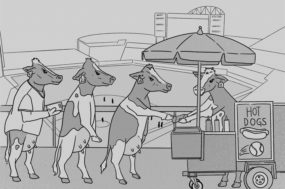Three years ago, 12 leading industry cooperatives came together to rally around a shared concept: Manure is a product and not a problem.
The vision of those dairy cooperatives, plus Dairy Management Inc. (DMI) and the National Milk Producers Federation (NMPF), was to accelerate the spread of digesters through a new company, Newtrient. Digesters were the primary environmental and economic effort being pursued in the industry at the time.
But as we further explored the feasibility of digesters, we saw the value for the energy they produced dropping and economics that didn’t add up. So we shifted our purpose to the broader environmental challenges and opportunities of our industry. We recognized there are a lot of things farmers are doing about environmental impacts on the farm that provide real benefit to the greater community.
We were faced with another challenge, which is: Dairy – as a commodity-based product – does not offer a built-in mechanism to cover the added costs of delivering those environmental benefits. We had the dilemma of providing benefits, such as clean water, lower fertilizer use, increased soil health and recycled fertilizer, yet we lacked a pathway for farmers to create a successful business venture.
So we regrouped and created our new mission: Reduce the environmental footprint of dairy and make it economically viable.
Clearer direction toward a better future
Following this defined purpose, our company focused its efforts with the full support of our forward-looking co-op members that collectively represent about half of the U.S. milk production. DMI, which manages the national dairy checkoff, provides significant investment, and NMPF offers valuable assistance with lobbying efforts and assures our message is national in focus.
What we see is an industry facing increasing regulatory, judicial and societal pressures to become more engaged in the environmental footprint discussion. We see surface and groundwater issues related to nitrogen and phosphorus, untapped capabilities to participate in the development of solutions around soil health, carbon sequestration or the reduction of greenhouse gas emissions.
Along the way, we also saw potential for the erosion in consumer confidence of dairy. Newtrient is uniquely positioned to help build consumer confidence. So instead of increased regulation, Newtrient sees an opportunity for more robust and positive incentives for dairy farmers first, and then for all of agriculture. And this is work that can generate income for farms, which is so critical in this current economic climate.
Newtrient has three unique areas of focus:
-
Technology catalog – This is the first and most tangible benefit for farmers. As we moved along our journey, we needed to understand all we could about the available tools for farmers beyond digesters.
We assembled a group of very well-respected and deeply skilled manure management and nutrient recovery technology experts who have reviewed more than 260 technologies and the vendors providing them. This is our Consumer Reports-type catalog, if you will, and it helps ensure farmers are getting the right tool from a reputable source.
-
Business development – Somewhere, people pay for every component of manure, whether it be energy, manure-based products such as fertilizer, phosphorus, nitrogen, compost, bedding and other products that can be made from the fiber of manure. So the business development side looks at these opportunities, and we incubate them.
For example, a company wanted to develop a manure fiber-based bagged product for retail customers. They came to Newtrient, and we helped them understand the characteristics of manure fiber. We also have companies coming to us saying, “We have something good here, but we don’t know how to bring it to the industry.”
So they are relying on Newtrient’s expertise of technologies, products and the industry to conduct due diligence and educate them on what they need to do to be of value to the dairy industry. This work has not only generated income from our services, but it has led us down a path of grants that support our work.
-
Ecosystem services – Farmers have always been at the forefront of food production. More recently, we’ve identified market-based solutions that allow farmers to do more than produce food – to receive economic benefits for practices that improve the environment. Here’s what this may look like.
Cities that flood frequently often do so because the upstream soils are not capable of holding moisture. Dairy farmland can be very helpful by processing manure and using it so the ground can hold more water than it would using only commercial fertilizer.
Or if wastewater treatment plants within municipalities are struggling to meet their phosphorus limits, it’s usually less expensive to pay farmers to manage their phosphorus in such a way that you achieve the same or better water quality outcomes than incurring a huge cost of expanding or building a wastewater treatment plant downstream.
I’m proud of the progress Newtrient has made these past three years, and I’m excited for our future. We have grown deep and useful relationships within the Natural Resources Conservation Service and Environmental Protection Agency, which will lead to a future of less regulation and better economic opportunity. We feel we are truly being heard in a way that has never existed.
We have an opportunity to show how dairy farming can benefit our communities and society. Milk is a great, almost magical, product, but what we do as farmers can go far beyond this product. In the same fashion that we found value in whey to help the success of processors, we can do the same thing with manure for dairy farmers.
We can enjoy a very different and positive environmental and economic future for dairy, and then for all of agriculture. ![]()
PHOTO: Newtrient. Courtesy image.
Steve Rowe is the CEO of Newtrient.
Your Dairy Checkoff in Action – The following update is provided by Dairy Management Inc. (DMI), which manages the national dairy checkoff program on behalf of America’s dairy farmers and dairy importers. DMI is the domestic and international planning and management organization responsible for increasing sales of and demand for dairy products and ingredients.





